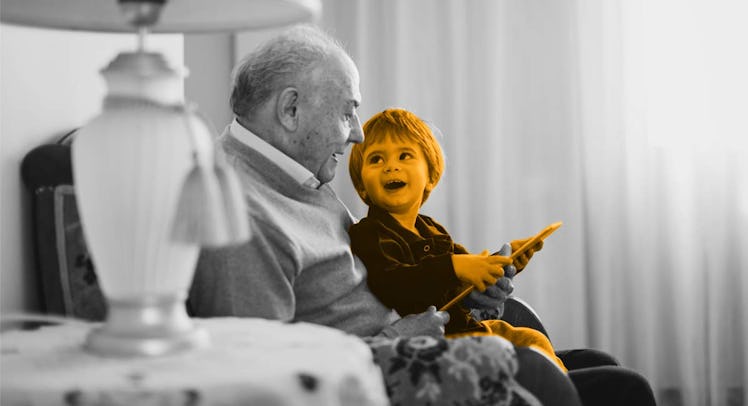How to Talk to Kids About Racist, Drunk, and Terrible Relatives
With a preparation, coaching, a good strategy and some swallowed pride, parents can turn interactions with difficult relatives into teachable moments.

Many parents wind up having to field questions from their kids about a distasteful or offensive relative. Perhaps it’s the creepy cousin who makes a parents skin crawl. Maybe it’s the serial liar aunt. Perhaps it’s the one-upping sister-in-law or the archetypical drunken uncle. Whoever it is, interactions with these jerks are often unavoidable and a bit hard to parse for children.
If parents have a history of engaging in fierce, uncensored debates with these people, when children are around it might be time to take a step back and swallow some pride. Denise Lang-Grant, a professional counselor and author of How to Stop Your Relatives from Driving You Crazy, says that parents should focus on not perpetuating that hostility through the next generation. An argumentative habit, however, is hard to break.
How to Prepare Kids for Dealing with Bad Relatives
- Develop a pregame strategy. Rehearse the conversations you’ll have with toxic relatives so your kids know how to avoid getting sucked into unpleasant interactions.
- Emphasize how your immediate family should act. Use a passive-aggressive or vindictive family member as an example of how your family should not conduct itself.
- Model respectful conversation. Just because your relative wants to lambast you, try not to reciprocate, and take the high ground when kids are in earshot.
- Communicate with your kid. Find out why they are uncomfortable around certain family members, and give them advice on how to deal with them.
“People don’t change,” Lang-Grant says. “We get together at these family gatherings—some of which are unavoidable, and many of which we’d like to do—and we expect it to be different. But it rarely is.”
Lang-Grant notes it’s e helpful to coach kids on what to expect. Tell children that it’s fine to respectfully disagree with older relatives and that those relatives are stuck in their ways and unlikely to change. If the kid is beginning to feel uncomfortable during a conversation, then it’s fine to leave the situation and go somewhere else for a while. All they need to do is show an appropriate level of respect.
RELATED: The Kids Are With My Ex. I’m Free. Then, the Guilt Comes
But awful relatives can also cast a black cloud over any gathering by smack-talking other family members behind their backs, rather than direct confrontation. But passive-aggressive family members can actually provide parents with a teachable moment, Lang-Grant says. If a kid hears someone talking ill of someone else, it is an opportunity to intervene and explain why that behavior is not OK.
“One of our responsibilities (as parents) is communicating with kids what the values of your immediate family are,” Lang-Grant says. “You can say ‘In our family, we don’t criticize others in front of other people. Yes, Aunt Sissy does, but we don’t have to accept it and we certainly don’t have to emulate it, and she is not part of our immediate family.”
Of course, it isn’t always possible to avoid difficult relatives, especially at functions and events. If parents get stuck sitting next to a hyper-political racist grandpa at a wedding, for example, it might feel impossible to let statements go unchecked. In these types of situations, parents can deliberately use the confrontation to model respectful debate to their kids. This shift in the way parents engage in these arguments can set a great example for observant children, says Dr. Jane McGregor, a founding member of the Society for Research into Empathy, Cruelty, and Sociopathy and author of Coping with Difficult Families. McGregor says that if parents can display a position of mutual respect when defending their views from a shitty relative, they are showing their kids a positive and assertive form of communication that they can emulate. “One can stick to this position even when the other person is hostile and unable to,” McGregor says. “This is assertiveness in action!”
ALSO: The 9 Words Parents Should Never Say to Their Kids
Preparation is key for parents and children, and that prep might even require a bit of role play. “Sometimes rehearsing scenarios and ways of dealing with them can really help,” McGregor says. “I have rehearsed difficult or anxiety making scenarios out myself and it helps and gives one confidence to deal with things in new ways.”
Both Lang-Grant and McGregor emphasize that kids should never be forced to show affection towards a family member. Forget rudeness or respect for elders here. If they don’t want anything to do with them, respect that, and find out what makes them so uncomfortable.
“If a child has real concern and angst over having relations with someone, their concern should be taken seriously,” McGregor says. “It is never right to force relations of any sort.”